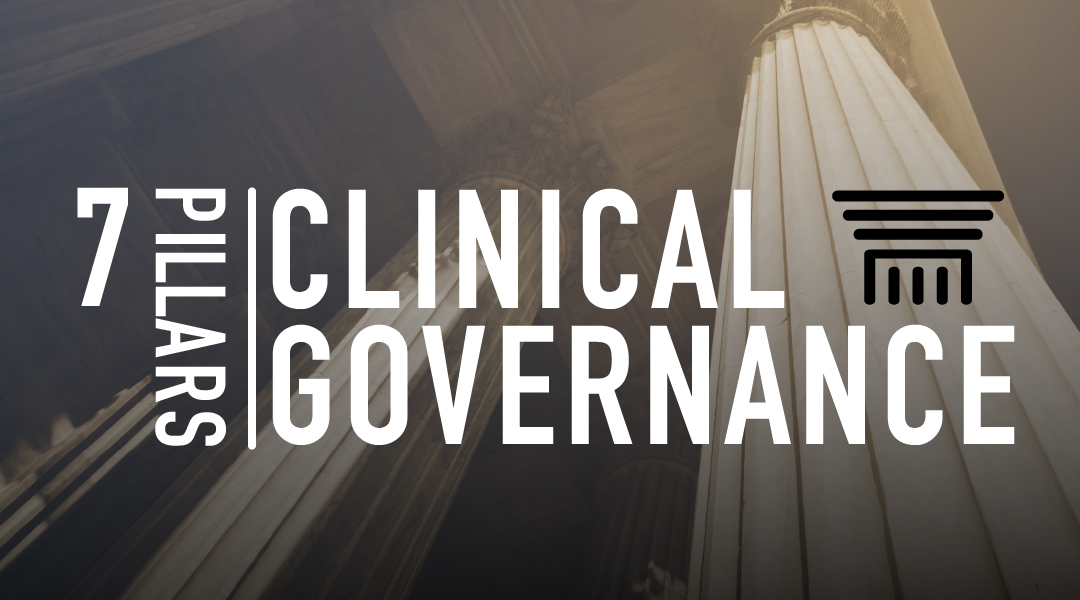Clinical Governance is corporate governance designed specifically for the NHS. Implemented first in the late 1990s after the Bristol Hospital Heart scandal, it has grown to be increasingly more important during the Covid-19 Pandemic. The 7 Pillars of Clinical Governance determine how successful a practice is.
What Are The 7 Pillars Of Clinical Governance?
The 7 Pillars of Clinical Governance are:
1) Education and Training
It is the responsibility of the Trust to oversee the Continuing Professional Development (CPD) of their clinicians. This means skills audits should be a regular part of your project governance.
2) Clinical Audit
This is the review of the clinical performance of a practice. Audits ensure that standards are maintained.
3) Clinical Effectiveness
This reviews whether specific clinical interventions work, as well as being cost-effective.
4) Staff Management
You should ensure you are hiring the best quality staff and ensure they keep up with their education and training throughout their time with you. This also involves project management to ensure that all projects are governed correctly and by the right people.
5) Patient and Public Involvement
Transparency with your stakeholders is essential for good governance. Clinical practice should never be shrouded in secrecy.
6) Risk management
In clinical governance there are 3 components to risk management:
- Risk to patients – this requires: compliance with statutory regulations, regularly reviewed and questioned systems, critical event audits, learning from complaints and finally, medical ethics standards.
- Risk to practitioners – this means protecting your workers through access to immunisations, creating an anti-harassment and safe working culture and keeping employees up to date on basic safety including fire safety.
- Risk to organisations – this is essentially ensuring good governance at every stage of your processes. This can be achieved by employing the best, creating a safe environment and engaging with your stakeholders.
There will likely be tiers to the priority of these risks but you should try to address all these risks as often as possible.
7) Information Management
Information governance is important in every industry but the NHS deals with special category data, patients information, and other sensitive information every day. There are also their own data protection protocols on top of the GDPR. It is of the utmost importance that all information is managed properly.
How Can You Improve Your Clinical Governance?
There are a few simple measures you can take to improve your clinical governance at every stage.
Firstly, you should make audits and reviews the final stage in every process. Efficiency should be at the heart of clinical practice. It is important to not cut corners for the sake of safety, but if there is a way to streamline procedures then it should be considered. This is where audits and reviews come in, to ensure that the process is the best it can be.
Secondly, you should ensure that information is shared effectively. Of course, you have to take into consideration what is special category data and can not be made public, but any findings on methods of improvement should always be shared. You should also learn from your counterparts in other areas of the NHS and keep open communication channels between all teams and departments.
Another consideration in the modern era is technology. You need software and technology that is as secure as possible, especially when patients’ and personnel’s information is involved. With the pandemic increasing remote or hybrid working for many non-essential workers, you also need technology that will allow for this.
How Can Convene Help You Improve Your Clinical Governance?
Convene is an award-winning Board Portal, now also available integrated with Microsoft Teams so your whole organisation can benefit from our range of features. Our management software is designed to streamline your meeting processes from start-to-finish.
Not only will we save you money, but our pre-meeting features can also save you time. We master efficiency, with our Agenda Builder being as simple as a drag-and-drop. Our post-meeting features also help with a built-in Audit Trail and auto generated Meeting Minutes you can spend your energy focusing on what really matters.
If you would like to learn more about how Convene can help your organisation, please contact us, or book a free demo today!

